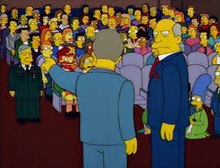
Troy McClure is a fictional character in the American animated series The Simpsons. He was originally voiced by Phil Hartman and first appeared in the second season episode "Homer vs. Lisa and the 8th Commandment". McClure is a washed-up actor who is usually shown doing low-level work, most notably hosting manipulative infomercials and questionable educational films. He appears as the main character in "A Fish Called Selma", in which he marries Selma Bouvier to aid his failing career and quash rumors about his personal life. McClure also hosts "The Simpsons 138th Episode Spectacular" and "The Simpsons Spin-Off Showcase".
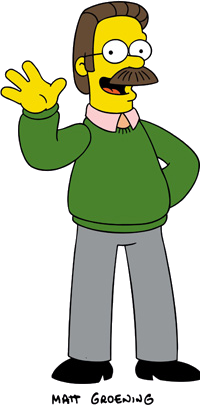
Nedward "Ned" Flanders Jr., commonly referred to by his surname, is a fictional character in the animated television series The Simpsons, voiced by Harry Shearer and first appearing in the series premiere episode "Simpsons Roasting on an Open Fire." He is the good-natured, cheery next-door neighbor to the Simpson family and is generally loathed by Homer Simpson, though there are numerous instances where the two are portrayed as good friends. A scrupulous and devout Evangelical Christian, he is among the friendliest and most compassionate of Springfield's residents and is generally considered a pillar of the Springfield community.

Josh Weinstein is an American television writer and producer, known for his work on the animated comedy series The Simpsons. Weinstein and Bill Oakley became best friends and writing partners at St. Albans School; Weinstein then attended Stanford University and was editor-in-chief of the Stanford Chaparral. He worked on several short-term media projects, including writing for the variety show Sunday Best, but was then unemployed for a long period.

Willie Sean Moran MacDougal, better known as Groundskeeper Willie, is a recurring character on The Simpsons, voiced by Dan Castellaneta. He is the head groundskeeper and Janitor at Springfield Elementary School. Willie is almost feral in nature and is immensely proud of his Scottish origin. He is easily identifiable by his red hair and beard, as well as his aggressive temperament and thick, stereotypical Scottish accent.

"Homer's Enemy" is the twenty-third episode of the eighth season of the American animated television series The Simpsons. It was first broadcast on the Fox network in the United States on May 4, 1997. "Homer's Enemy" was directed by Jim Reardon and written by John Swartzwelder, based on an idea pitched by executive producer Bill Oakley.

William Lloyd Oakley is an American television writer and producer, known for his work on the animated comedy series The Simpsons. Oakley and Josh Weinstein became best friends and writing partners at St. Albans School; Oakley then attended Harvard University and was Vice President of the Harvard Lampoon. He worked on several short-term media projects, including writing for the variety show Sunday Best, but was then unemployed for a long period.
"$pringfield ", simply known as "$pringfield", is the tenth episode of the fifth season of the American animated television series The Simpsons, and the 91st episode overall. It originally aired on the Fox network in the United States on December 16, 1993. In the episode, Springfield legalizes gambling to revitalize its economy. Mr. Burns opens a casino where Homer is hired as a blackjack dealer. Marge develops a gambling addiction, Bart opens a casino in his tree house, and Burns' appearance and mental state deteriorate à la Howard Hughes.

"22 Short Films About Springfield" is the twenty-first episode of the seventh season of the American animated television series The Simpsons. It originally aired on the Fox Network in the United States on April 14, 1996. It was written by Richard Appel, David X. Cohen, Jonathan Collier, Jennifer Crittenden, Greg Daniels, Brent Forrester, Dan Greaney, Rachel Pulido, Steve Tompkins, Josh Weinstein, Bill Oakley, and Matt Groening, with the writing being supervised by Daniels. The episode was directed by Jim Reardon. Phil Hartman guest-starred as Lionel Hutz and the hospital board chairman.
"Two Bad Neighbors" is the thirteenth episode of the seventh season of the American animated television series The Simpsons. It was written by Ken Keeler, directed by Wes Archer and inspired by the animosity toward the series' earlier run from the Bushes. In the episode, George H. W. Bush, the 41st President of the United States, moves across the street from the Simpsons. Homer seeks revenge after the former President spanks Bart for his bad behavior.
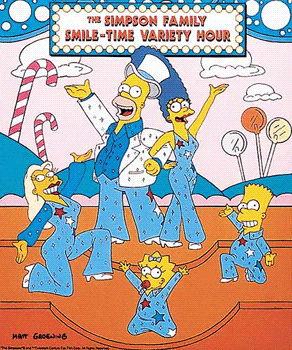
"The Simpsons Spin-Off Showcase" is the twenty-fourth and penultimate episode of the eighth season of the American animated television series The Simpsons. It originally aired on the Fox network in the United States on May 11, 1997. The episode centers on fictional pilot episodes of non-existent television series derived from The Simpsons, and is a parody of the tendency of networks to spin off characters from a hit series. As such it includes references to many different TV series. The first fictional spin-off is Chief Wiggum P.I., a cop-dramedy featuring Chief Wiggum and Seymour Skinner. The second is The Love-matic Grampa, a sitcom featuring Moe Szyslak who receives dating advice from Abraham Simpson, whose ghost is possessing a love testing machine. The final segment is The Simpson Family Smile-Time Variety Hour, a variety show featuring the Simpson family except for Lisa, who has been replaced.

"Lisa's Date with Density" is the seventh episode of the eighth season of the American animated television series The Simpsons. It originally aired on the Fox network in the United States on December 15, 1996. It was written by Mike Scully and directed by Susie Dietter. The episode sees Lisa develop a crush on Nelson Muntz. When they start dating and Lisa is unable to reform him, she ends their relationship. In the subplot, Homer uses an autodialer in a telemarketing scheme that annoys all of Springfield's residents.
"Grade School Confidential" is the nineteenth episode of the eighth season of the American animated television series The Simpsons. It originally aired on the Fox network in the United States on April 6, 1997. It was written by Rachel Pulido and directed by Susie Dietter. The episode establishes the long-term relationship between Seymour Skinner and Edna Krabappel. Bart witnesses a romantic moment between Principal Skinner and Mrs. Krabappel and acts as a gofer for them. However, they later embarrass him and he exposes their romance to the public.

Principal Seymour Skinner is a recurring fictional character in the animated sitcom The Simpsons, who is voiced by Harry Shearer. He is the principal of Springfield Elementary School, which he struggles to control, and is constantly engaged in a battle against its inadequate resources, apathetic and bitter teachers, and often rowdy and unenthusiastic students, Bart Simpson being a standout example.
"Homer the Smithers" is the seventeenth episode of the seventh season of the American animated television series The Simpsons. It originally aired on the Fox network in the United States on February 25, 1996. In the episode, Smithers takes a vacation and hires Homer to temporarily replace him as Mr. Burns' assistant.
"Bart After Dark" is the fifth episode of the eighth season of the American animated television series The Simpsons. It originally aired on the Fox network in the United States on November 24, 1996. After accidentally breaking a stone gargoyle at a local house, Bart is forced to work there as punishment. He assumes it will be boring work, but is surprised when he learns that it is actually a burlesque house. Marge is horrified when she learns of the burlesque house, and resolves to have it shut down. The episode was directed by Dominic Polcino and written by Richard Appel.
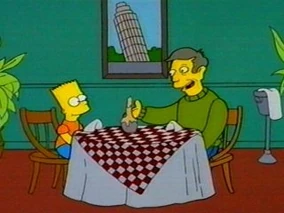
"Sweet Seymour Skinner's Baadasssss Song" is the nineteenth episode of the fifth season of the American animated television series The Simpsons, and the 100th episode overall. It originally aired on the Fox network in the United States on April 28, 1994. In the episode, Superintendent Chalmers fires Principal Skinner after a disaster at the school. Bart, feeling partially responsible for Skinner's firing, tries to help his old principal get his job back.
Media is a recurring theme of satire on The Simpsons. The show is known for its satire of American popular culture and especially television culture, but has since its inception covered all types of media such as animation, journalism, commercials, comic books, movies, internet, and music. The series centers on a family and their life in a typical American town but the town of Springfield acts as a complete universe. The town features a vast array of media channels—from kids' television programming to local news, which enables the producers to make jokes about themselves and the entertainment industry.

The ninth season of the American animated television series The Simpsons originally aired on the Fox network between September 1997 and May 1998, beginning on Sunday, September 21, 1997, with "The City of New York vs. Homer Simpson". Mike Scully served as showrunner for the ninth production season. The ninth broadcast season contained three episodes with 4F-series production codes, indicating that they were hold-over episodes from production season eight, and two episodes with 3G-series production codes, which are not explicitly confirmed to be part of any production season but are speculated to be relabeled 3F-series episodes. This makes it the first broadcast season to include holdover episodes from two previous production seasons.

The fifth season of the American animated television series The Simpsons originally aired on the Fox network between September 30, 1993, and May 19, 1994. The showrunner for the fifth production season was David Mirkin who executive produced 20 episodes. Al Jean and Mike Reiss executive produced the remaining two, which were both hold overs that were produced for the previous season. The season contains some of the series' most acclaimed and popular episodes, including "Cape Feare", "Lisa vs. Malibu Stacy", "Homer Goes to College", "Deep Space Homer", and "Rosebud". It also includes the 100th episode, "Sweet Seymour Skinner's Baadasssss Song". The season was nominated for two Primetime Emmy Awards and won an Annie Award for Best Animated Television Program as well as an Environmental Media Award and a Genesis Award. The DVD box set was released in Region 1 on December 21, 2004, Region 2 on March 21, 2005, and Region 4 on March 23, 2005.
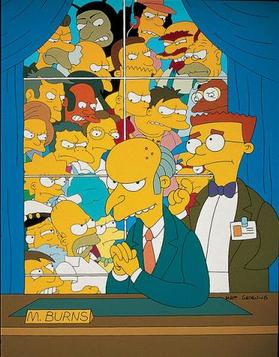
"Who Shot Mr. Burns?" is a two-part episode of the American animated television series The Simpsons.Part One is the twenty-fifth and final episode of the sixth season and originally aired on the Fox network in the United States on May 21, 1995, while Part Two is the season premiere of the seventh season and aired on September 17, 1995.
